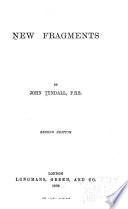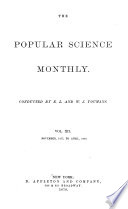 | John Tyndall - 1892 - 522 pages
...subtleties as Rumford himself. They regarded heat as ' a very brisk agitation of the insensible parts of an object which produces in us that sensation from whence we denominate the object hot; so what in our sensation is heat, in the object is nothing but motion.' Locke, from whom I here quote,... | |
 | Henry Coppée - 1895 - 552 pages
...utterance which of late years has been most widely circulated is the following. " Heat," says Locke, " is a very brisk agitation of the insensible parts of...sensation from whence we denominate the object hot ; so what in our sensation is heat, in the object is nothing but motion. This appears by the way heat is... | |
 | 1878 - 804 pages
...Conduct of the Human Understanding, Elements of Natural Philosophy," chap. ii., where he says : " Heat is a very brisk agitation of the insensible parts of the object which produces in us that sensation whence we denominate the object hot ; so what in our sensation is heat, in the object is nothing but... | |
 | Harry Thurston Peck - 1898 - 988 pages
...modern ideas on the subject. He says : ' ' Heat is a very brisk agitation of the insensible parts of an object which produces in us that sensation from whence...object hot; so that What in our sensation is heat, m the object is nothing but motion." About the same 399 Heath. time, Huygens, in his Tractatue de Lamine,... | |
 | 1898 - 734 pages
...philosopher, a few years later said that heat "is a very brisk agitation of the insensible parts of an object which produces in us that sensation from whence...that what in our sensation is heat, in the object Is nothing but motion." Becher, a German chemist, discovered boracic acid about 1660 .and made many other... | |
 | Thomas Curran Ryan - 1905 - 352 pages
...the pale of doubt by the excellent quantitative researches of Mr. Joule. ' Heat," says Locke, ' is a very brisk agitation of the insensible parts of the object, which produce in us that sensation from which we denominate the object hot ; so what in our sensation is... | |
 | 1907 - 280 pages
...been made clearer. More than two centuries ago, Locke, the English philosopher, said that " Heat is a very brisk agitation of the insensible parts of...that what in our sensation is heat, in the object is nothing but motion." Francis Bacon had also previously expressed a similar thought in his Novum Organum.... | |
 | Arthur Erich Haas - 1909 - 132 pages
...the insensible parts ot' the object. which produceth in us that Sensation from whence we dunominate the object hot; so that what in our Sensation is heat, in the object is nothing but motion. 46I Experiment» et notae circa caloris et frigoris originem seu productionem mechanicam... | |
 | William Duane Ennis - 1910 - 464 pages
...motion THE NATURE AND EFFECTS OF HEAT 3 was produced by an "igneous matter." Locke defined heat as "a very brisk agitation of the insensible parts of...the object, which produces in us that sensation from which we denominate the object hot ; so [that] what in our sensation is heat, in the object is nothing... | |
 | John Tyndall - 1915 - 634 pages
...utterance which of late years has been most widely circulated is the following : ' Heat,' says Locke, ' is a very brisk agitation of the insensible parts of the! object, which produces in ns that sensation from whence we denominate the object hot ; so what in our sensation is heat, in the... | |
| |